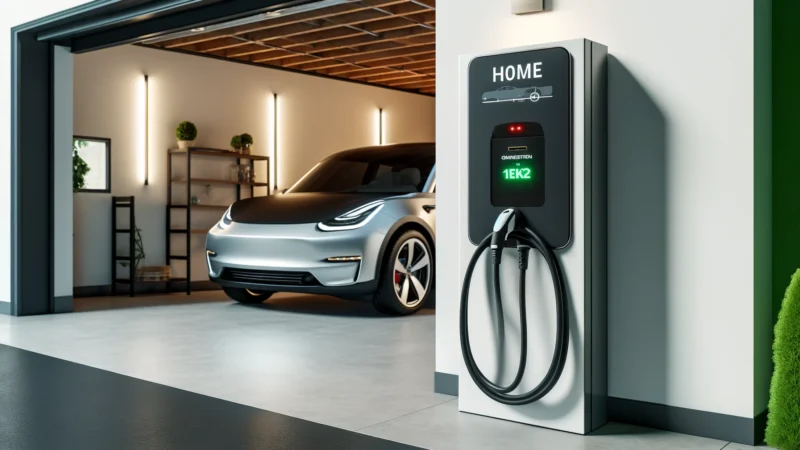Electric vehicles (EVs) are not just a trend—they represent a powerful shift in how people view transportation. As EV adoption continues to soar, the demand for reliable and efficient home EV charging stations grows alongside it. Particularly, 7kW home charging stations have become the most favored choice due to their balance of speed, affordability, and convenience. But what exactly goes on behind the scenes in the factories that manufacture these chargers? Let’s delve into detailed insights about OEM (Original Equipment Manufacturer) 7kW home EV charging station production.
Understanding OEM Production of 7kW Charging Stations
An OEM product, including EV chargers, is manufactured by specialized factories and sold under different brands. This approach allows brands to deliver high-quality, fully tested products rapidly without the complexities of setting up in-house production. Let’s uncover the intricate process behind OEM 7kW home charging station manufacturing and why this method has proven successful.
Why 7kW EV Chargers?
First, let’s look at why the 7kW power level has become popular for home chargers:
- Charging Speed: Ideal for overnight charging, fully charging a standard EV battery (50kWh) in roughly 7-8 hours.
- Cost-Effective: Lower costs in installation and operation compared to higher-power stations.
- Compatibility: Easily integrated into typical residential electrical systems.
Market Snapshot
According to recent data from EV industry reports:
- The global residential EV charging market is expected to grow by 26.5% annually from 2023-2028.
- 7kW chargers currently hold about 55% of the residential charging market share.
Inside the Factory: Step-by-Step OEM Manufacturing Process
OEM factories specializing in 7kW chargers employ sophisticated, streamlined processes ensuring each unit is produced with precision, efficiency, and reliability. Let’s explore these critical production steps:
1. Component Procurement and Inspection
Factories source high-quality components such as charging interfaces, electronic control units (ECUs), cables, circuit boards, and outer casings. Upon arrival, rigorous inspections are conducted, ensuring compliance with standards such as IEC 61851 and RoHS.
2. Automated PCB Assembly (Surface Mount Technology – SMT)
Advanced factories deploy automated SMT lines where robotic arms precisely position electronic components onto printed circuit boards (PCBs). This automation ensures consistent quality and reduces human error significantly.
3. Assembly Line Integration
Post-PCB assembly, skilled technicians integrate components including the charging plug (Type 2), cabling, and protective casings. Automated tools assist in accurate placement, sealing, and connection, ensuring that every charger meets exact specifications.
4. Quality Assurance and Testing
Each assembled unit undergoes meticulous testing procedures including:
- Electrical Testing: Load, insulation, and leakage current tests.
- Thermal Management: Stress testing to ensure chargers operate efficiently within temperature extremes (-30°C to +50°C).
- Durability Tests: Robustness and resistance against weather elements (IP54 standard).
5. Final Inspection and Packaging
Before leaving the factory, every unit is visually inspected and electronically verified. Once approved, chargers are carefully packed to prevent damage during shipping.
Data-Driven Quality Assurance
Here’s how OEM factories maintain rigorous standards using a data-driven approach:
| Test Type | Compliance Rate (%) | Industry Standard |
|---|---|---|
| Electrical Load Test | 99.9% | IEC 61851 |
| Weather Resistance | 99.5% | IP54 |
| Thermal Efficiency | 99.7% | -30°C to +50°C |
Benefits of OEM Production for Brands
Choosing OEM production of 7kW EV chargers offers several significant advantages:
1. Reduced Costs and Time-to-Market
OEM production reduces upfront investment in R&D, equipment, and manufacturing facilities, allowing brands to launch products faster at competitive prices.
2. Guaranteed Quality
Factories specializing in OEM products are committed to maintaining stringent quality standards, reducing warranty claims, and enhancing customer satisfaction.
3. Customizable Product Options
Brands benefit from customization possibilities, ranging from aesthetic adjustments to functional enhancements, software integration, and branding.
Real-World Example: Success Story
Take “ChargeSmart,” a fictional yet illustrative example brand. By partnering with a reputable OEM factory, ChargeSmart launched their line of 7kW chargers swiftly. Within the first year:
- Product defect rates remained below 0.5%.
- Customer satisfaction ratings surpassed 95%.
- Sales increased by 120%, driven by reliability and competitive pricing.
Consumer Perspective: What Homeowners Expect
Consumers investing in a 7kW EV charging station prioritize:
- Reliability (minimum downtime)
- Easy installation and use
- Affordability
- Availability of customer support
OEM factories are positioned perfectly to meet these expectations through meticulous production practices and effective after-sales service.
Future Trends in OEM EV Charger Manufacturing
The future holds exciting developments. Factories are already incorporating:
- Smart connectivity (Wi-Fi and Bluetooth integration)
- Integration with home energy management systems
- Enhanced safety and diagnostics features
These innovations ensure OEM-manufactured EV chargers remain at the forefront of technological advancements.
Conclusion
OEM home EV charging station production, particularly for the popular 7kW models, is a meticulous and sophisticated process that blends advanced technology, rigorous testing, and comprehensive quality controls. Brands leveraging OEM partnerships benefit immensely through cost efficiencies, rapid market entry, superior product quality, and satisfied customers.
As the global market for EV home charging continues its remarkable growth, OEM factories will undoubtedly play a pivotal role in shaping the future of convenient, efficient, and affordable EV charging solutions for millions of homeowners worldwide.




